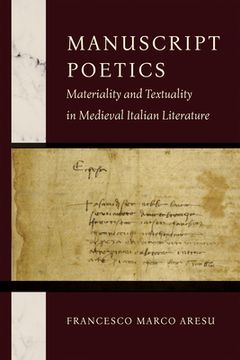Manuscript Poetics: Materiality and Textuality in Medieval Italian Literature (in English)
Synopsis "Manuscript Poetics: Materiality and Textuality in Medieval Italian Literature (in English)"
Manuscript Poetics explores the interrelationship between the material features of textual artifacts and the literary aspects of the medieval Italian texts they preserve.This original study is both an investigation into the material foundations of literature and a reflection on notions of textuality, writing, and media in late medieval and early modern Italy. Francesco Marco Aresu examines the book-objects of manuscripts and early printed editions, asking questions about the material conditions of production, circulation, and reception of literary works. He invites scholars to reconcile reading with seeing (and with touching) and to challenge contemporary presumptions about technological neutrality and the modes of interfacing and reading. Manuscript Poetics investigates the correspondences between textuality and materiality, content and medium, and visual-verbal messages and their physical support through readings of Dante Alighieri's Vita nova, Giovanni Boccaccio's Teseida, and Francesco Petrarca's canzoniere (Rerum vulgarium fragmenta). Aresu shows that Dante, Boccaccio, and Petrarca evaluated and deployed the tools of scribal culture to shape, signal, or layer meanings beyond those they conveyed in their written texts. Medieval texts, Aresu argues, are uniquely positioned to provide this perspective, and they are foundational to the theoretical understanding of new forms and materials in our media-saturated contemporary world.

